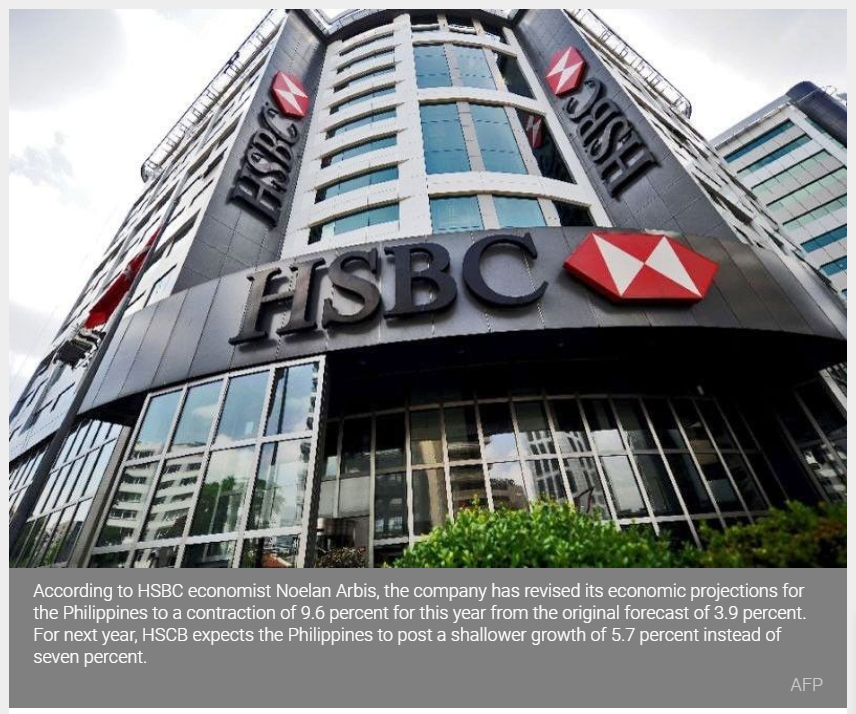HSBC sees Philippine economy contracting 9.6%
MANILA, Philippines — British banking giant HSBC expects the Philippine economy to contract deeper by 9.6 percent this year due to the rising number of COVID-19 cases in the country.
According to HSBC economist Noelan Arbis, the company has revised its economic projections for the Philippines to a contraction of 9.6 percent for this year from the original forecast of 3.9 percent. For next year, HSCB expects the Philippines to post a shallower growth of 5.7 percent instead of seven percent.
“The Philippines now appears to be one of the worst-hit economies from COVID-19, prompting us to revisit our GDP assumptions. The continued rise in COVID-19 cases domestically remains a serious concern, and in our view, has dashed any hopes for a meaningful recovery in the second half,” Arbis said.
Moreover, Arbis said the absence of a big-ticket stimulus is likely to dampen the recovery in the year ahead.
The economist explained lockdowns have had a heavy impact on private consumption globally as the country’s economy contracted by nine percent in the first half.
The GDP contracted by a record 16.5 percent in the second quarter from 0.7 percent in the first quarter as the economy stalled after Luzon was placed under enhanced community quarantine to slow the spread of the virus.
“As seen from the Philippines’ second quarter gross domestic product, almost every single component of the consumption basket showed meaningful contractions from the previous year.
With Metro Manila back under strict lockdown measures, private consumption is unlikely to bounce back meaningfully in the third quarter, ” Arbis said.
After being relaxed with the shift to the general community quarantine for the National Capital Region (NCR) in June, the lockdown was tightened anew as Metro Manila and nearby provinces reverted to the modified enhanced community quarantine from Aug. 4 to 18 due to the rising number of COVID-19 cases.
The economist also said the declining remittances from overseas Filipino workers (OFWs), rising unemployment, and absence of a big-ticket stimulus program from the government has reduced expectations for a meaningful recovery in the near-term.
“The government’s preferred fiscal support only amounts to around P162 billion or 0.8 percent of GDP of supplementary funds. We believe this is not nearly enough to offset the substantial impact of the pandemic on the economy,” he said.
According to HSBC, private construction has fallen and is unlikely to recover significantly in the near-term as corporations protect their bottomline.
Meanwhile, HSBC said the government’s increased spending on much needed services such as healthcare and social safety nets could divert funds from infrastructure projects, curtailing fixed investment growth in the quarters ahead.
“The persistent rise of COVID-19 cases domestically and globally presents multiple challenges to the Philippine economy’s ability to recover in the quarters ahead,” Arbis said.
Source: https://www.philstar.com/business/2020/08/11/2034295/hsbc-sees-philippine-economy-contracting-96


 English
English




